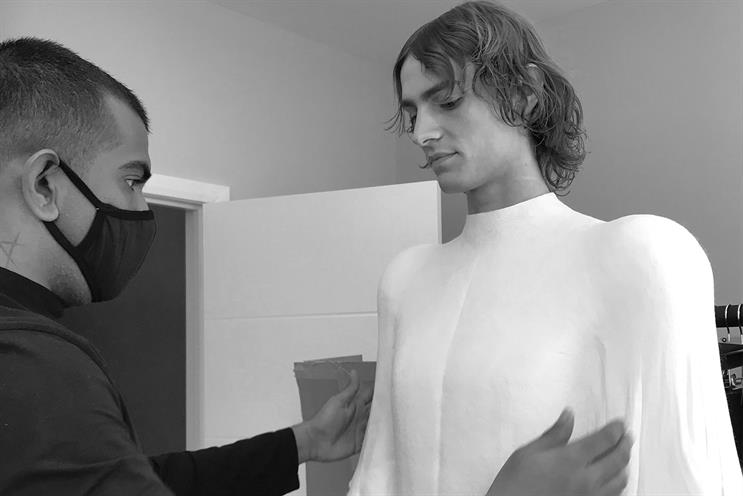
London Fashion Week took place last weekend as a digital event, very much in keeping with the current lockdown landscape.
But unlike many online events that seem to be chasing the old narrative, some innovative production created a Fashion Week that not only served the needs of designers, who needed to generate sales from the public for their existing collections and entice retailers into making orders for next season’s products, it also opened up the conversation about diversification within the industry.
Caroline Rush, chief executive of the British Fashion Council, explained that as it became evident the coronavirus crisis would affect designers' sales to retailers, building a digital direct-to-consumer connection was essential.
"All of our designers were going to be sitting on the excess stock from the stores that had cancelled orders that were about to be delivered. So, as important as it would be to communicate to the international trade audience, it was also important to keep it open and give access to consumers to discover and meet our designers. [It would also] be a route to develop their direct-to-consumer businesses which would allow them to clear some of the stock."
When it comes to diversity and inclusion, according to Ollie Olanipekun, co-founder and creative director at Superimpose, in their traditional format, "there was no way that fashion weeks, as we used to know them, could ever be truly inclusive". Having worked on the production of Men’s Fashion Week in January, Olanipekun celebrated the fact this digital iteration was for everyone.
He added: "With this new transparent, global, completely accessible platform, there is every reason to ensure equitable representation of all voices, creeds, and colours at the forefront of fashion innovation. Only time will tell if the British Fashion Council can truly step up into reality."
Wednesday Agency worked alongside the BFC on executing the creative direction of the new platform, which was scoped and built in just eight weeks. Inspiration was drawn from the creativity, diversity and ingenuity of London as a fashion capital.
Tammy Smulders, president of Wednesday Agency, said: "The British Fashion Council has made it a priority to widen the appeal of London Fashion Week, with a plethora of programming designed to invite the general public to discover creativity and explore their own sense of self-expression through the London Fashion Week.
"With our creative approach, we wanted to pose the kinds of questions all kinds of people would have around fashion and its role, and how fashion reflects and creates a dialogue around a multitude of important societal topics. The art direction and visual approach takes a point of view, without appealing to any single type of person or drawing on a particular style or aesthetic."
The platform hosted podcasts, talks, virtual showcases and digital showrooms. Natalie Hughes, founder and director of The Fashion Digital, was impressed by how democratic, reactive and spontaneous the event was able to be.
"One of my favourite moments was Charles Jeffrey's Solasta," she said. Instead of holding a previously planned virtual dance party, he used the platform as a showcase for black talent and a fundraiser for UK Black Pride.
"A malleable digital calendar allows for spontaneous 'happenings' like these – something that feels not only more relevant but necessary in the high-speed world of social media."
The new platform will remain live indefinitely, with the next Fashion Week to take place in September. The way the upcoming event will be formatted is not set in stone, due to government guidelines yet to be revealed, but it is expected to be a hybrid of a physical and digital event.
The rules surrounding content production are already emerging and it is thought the existing digital platform will be used as a way to continue to celebrate and showcase brands, designers and the poignant conversation happening among the industry.
Rush recalls that the UK led the way 11 years ago with live streaming shows. And it is this same direct-to-consumer momentum that will continue to drive changes.
"We’ve been opening up London Fashion Week and creating direct-to-consumer experiences as part of that and thinking about how we can elevate the platform of Fashion Week to drive consciousness in terms of retail and support businesses," she said. "So we had to think of what we could do in the digital world when we are in lockdown that could emulate that and really go further to open the door to consumers."
A combined 3.5 million reach was achieved by London Fashion Week across all platforms, with the reduced barriers to entry moving the event away from big-budget catwalks and making it accessible to anyone with an internet connection and a smartphone.
Hughes added: "The likes of Rixo, Preen by Thornton Bregazzi and Louise Gray all presented pieces via lo-fi mood films; Rixo's sneak-peek video was recorded at co-founder Henrietta's family home, while Louise Gray collaged together vlog-style phone footage."
And although the traditional show spectacle was missed, it seems the "invitation-only" narrative was not - so the British Fashion Council's commitment to keeping parts of Fashion Week open to all, and online, will be welcomed.


